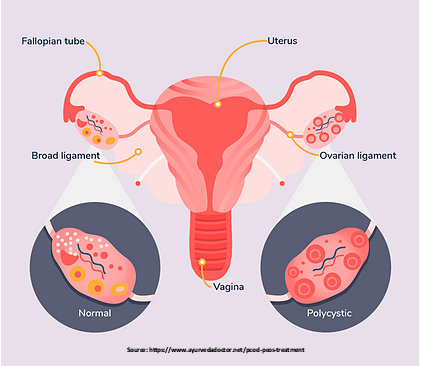PCOD – Polycystic Ovarian Disease affects the majority of young women. Many young females in Mumbai suffer from this condition. PCOD affects a large number of young women since it strikes at a young age. PCOD can affect people of all ages. However, the majority of those affected are between the ages of 18 and 45.

Do you feel you might have PCOD? Dr. Shweta Shah, one of the best gynaecologist in Malad, has provided all of the information you need to clear your worries about PCOD and pursue treatment.
First, let’s know,
What Causes PCOD?
- The exact cause of PCOD is currently unknown. However, there are some aspects of the condition that are unique to it:
- The ovaries usually produce female sex hormones and a small number of male sex hormones (androgens). In addition, it aids in the proper growth of eggs in the ovaries during each menstrual cycle.
- It is considered that PCOD results from a hormonal imbalance in the sex hormones. In PCOD, the sex hormones start producing more androgens. As a result, it may stop ovulation, break out acne, and develop excess face and body hair.

- Follicles are sac-like structures that carry eggs within the ovaries. During each menstrual cycle, one or more eggs are usually released. It’s known as ovulation.
- The eggs in these follicles do not develop in PCOD patients. As a result, they don’t expel from the ovaries. Instead, they can form small cysts in the ovary, giving rise to the term polycystic ovaries.
- PCOD appears to be inherited. So, if some women in your blood relation have PCOD, irregular periods, or diabetes, your chances of getting them are increased.
Let’s know,
What are the Symptoms of PCOD?
- Keep an eye on the following PCOD symptoms:
- Amenorrhea – Irregular periods that occur every 2 to 3 months
- Menorrhagia – Heavy bleeding
- Hirsutism – Unusual body hair growth
- Chronic acne that doesn’t heal with regular treatment
- Weight gain, particularly around the waist
- Darkening or pigmentation around the neck
- Male pattern hair distribution
The patient may have one or more of these symptoms.
Even if you are slim and have clear skin, you may still have PCOD. It’s because PCOD is an endocrine condition that affects multiple body systems.
What are the Complications in PCOD?
- PCOD that isn’t under control can cause several issues in conceiving and an elevated risk of developing type 2 diabetes.
- If the patient becomes pregnant while suffering from unmanaged PCOD, she may have a higher risk of perinatal problems such as pre-eclampsia and gestational diabetes.
- The patient may also be at a higher risk of endometrial cancer in the long run.
- Increased cholesterol levels and high blood pressure are two more potential concerns.
Don’t worry; if you follow the right treatments and keep your health under control, these complications will not occur.
Now, let’s discuss,
Treatment of PCOD
- There is currently no permanent cure for PCOD. The patient can, however, control the condition by altering the lifestyle. It is also possible that the patient may need to use a multidisciplinary strategy. For treatment, it enlists the help of a dietician, a gynecologist, and other specialists.
- The most effective strategy to control and manage PCOD is to maintain a healthy weight. Even a 5% weight loss can make a significant difference in the treatment of the condition. So, strive to exercise regularly and eat a nutritious diet.
- Sugars and carbohydrates should be limited in the diet. Instead, consume high-protein, high-fibre foods to control the weight and alleviate PCOD symptoms.
- PCOD treatment can be done based on the symptoms. For example, the menstrual cycle can be regulated using birth control tablets and other medications. In addition, it will help with acne and hair growth, which are both signs of PCOD.
- If none of these treatments work, Dr. Shweta Shah, one of the best gynecologist in Mumbai, may recommend surgery. Ovarian drilling is a surgery that aids in the restoration of regular ovulation.
- However, the patient must keep in mind that no drug or treatment will be effective unless they make appropriate lifestyle modifications.
Now, let’s discuss about,
PCOD and Pregnancy
If PCOD is under control, getting pregnant is not a problem. However, if the patient doesn’t maintain the condition, they’ll need medicine. In the critical scenario, the patient may require assisted reproductive technologies (ART).
In addition, if a woman has PCOD, her ovarian reserve is reduced, and she is unable to produce healthy eggs. So, if a woman wishes to have children, Dr. Shweta Shah, one of the best gynecologist in Mumbai, may recommend her to get pregnant before it’s too late. It is because the quality of eggs degrades as women get older.
PCOD is not a severe problem to be concerned about as long as it is appropriately managed. So, seek advice from one of the best gynecologist doctor in Mumbai. They can advise the patient and create a treatment plan to help manage the condition properly.

